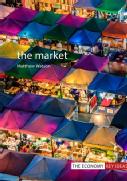Activities and Outputs
University of Copenhagen Book Talk


On May 18th 2018 I was invited to give a talk on my new book, The Market, to the MA students in International Political Economy at the University of Copenhagen. The book talk took the form of a question-and-answer session compered by Professor Ben Rosamond, allowing his students to ask me whatever they wanted to do about how I had come to write the book in the way that I have.
